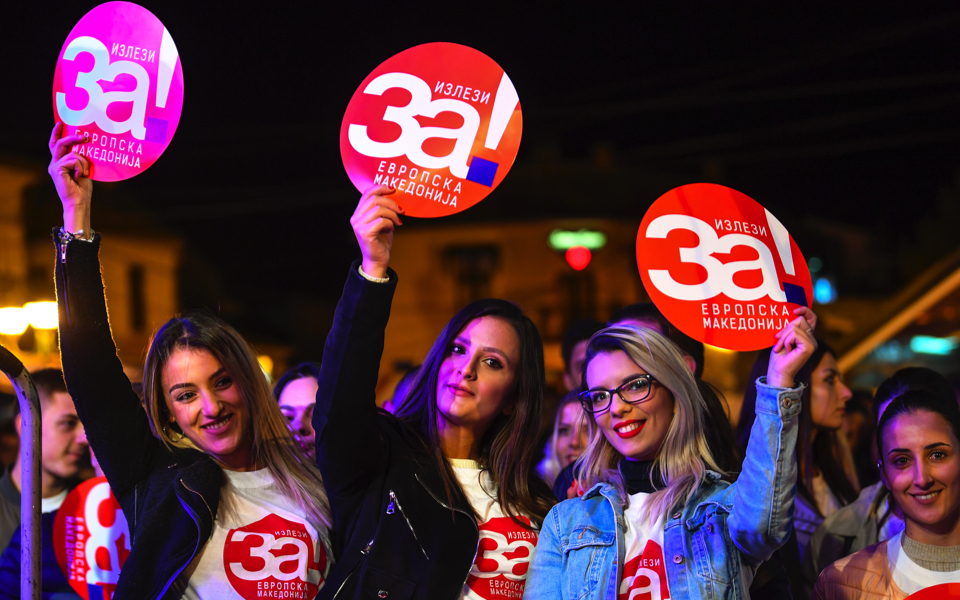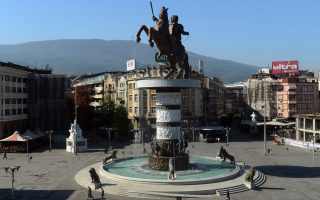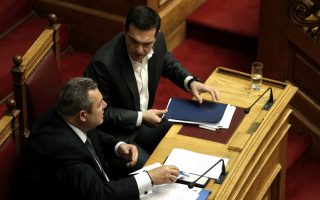FYROM referendum: Where it will be truly won or lost

Only a couple of days remain until Sunday’s referendum in the Former Yugoslav Republic of Macedonia regarding the so-called Prespes agreement. In my opinion, the results of a recent poll by Market Vision and the stance of the country’s political leadership give rise to three important points:
1. The question raised in the referendum is formulated in a way that affects the outcome in favor of the “yes” side. Consequently, the referendum is not neutral.
In particular, the question to be voted on is: “Are you in favor of joining the European Union and NATO by accepting the agreement between the Republic of Macedonia and Greece?”
Fifty-one percent of the sample who participated in the survey responded “yes” to this question, while 49 percent said “no.”
However, for the question “Are you in favor of the agreement with Greece to change the name of the Republic of Macedonia?” only 47 percent of the respondents answered “yes,” while 53 percent responded “no.”
Given that FYROM’s accession to the EU and NATO will automatically be blocked if the agreement with Greece does not go through, as German Chancellor Angela Merkel and NATO Secretary-General Jens Stoltenberg clarified, the two questions raised above are essentially identical. Therefore, the specific wording of the question in the upcoming referendum appears able to shape the final outcome to a critical extent.
2. Without the participation of ethnic Albanians in the referendum, the “yes” side would be highly unlikely to win.
In particular, according to the same poll, ethnic Albanians are overwhelmingly in favor of the agreement, with 95 percent of them voting “yes” compared to only 33 percent of the Slavic population.
In other words, if the ethnic composition of FYROM were as homogeneous as it is in Greece (with the Slavic population prevailing), the “no” vote would probably win by a great margin, as would be the case in the hypothetical scenario where a referendum were held in Greece as well.
This observation is in direct contradiction to the view that “the Prespes agreement meets Skopje’s long-term demands,” which has been put forward by some Greek parties following recent revelations by WikiLeaks.
3. “If you cannot win the referendum, try to undermine the credibility of its result.”
FYROM’s nationalist President Gjorge Ivanov has called on the people to boycott the referendum. The majority of FYROM’s diaspora is in support of this. At the same time, main opposition VMRO-DPMNE leader Hristijan Mickoski, under intense international pressure, has presented an ambiguous stance over the matter. Although he described the agreement between Greece and FYROM as a “betrayal to the country,” he called on his party’s voters to decide according to their conscience whether or not to come to the polls in order to vote against it.
The impact of a boycott on a final result in favor of the “yes” vote could be dramatic. Let’s say there are 10 potential voters. Five oppose the agreement while the other five are in favor. If all 10 people participated in the poll, the result would be exactly 50-50 with 100 percent participation. On the other hand, if two out of the five who oppose the agreement chose to boycott the referendum, the “yes” vote would reach 63 percent with 80 percent participation. Consequently, boycotting the referendum serves to benefit the “yes” side.
This simple observation raises a plausible question: What is the aim of choosing to boycott the referendum, a tactic promoted by Ivanov and, indirectly, by the main opposition?
One possible explanation is that under the current circumstances (the ethnic composition of the population, the wording of the referendum question etc), people consider it particularly difficult for the “no” vote to prevail. The only way to sabotage the whole process of ratifying the agreement between Greece and FYROM is to undermine the credibility of the referendum itself.
As argued by the main opposition party, in order for Sunday’s referendum to be successful, participation must exceed 50 percent. Hence, the boycott attempts to take advantage of the already large number who will not turn out to vote, regardless of whether or not they agree with the boycott, because they have recently migrated abroad. Foreign Minister Nikola Dimitrov has calculated this number to be around 300,000 to 400,000 out of a total of 1.8 million registered voters.
In practice, this means that to reach the 50 percent threshold, the real turnout (i.e. the share of those living inside the borders) should be in the order of 60-65 percent at least.
Based on the above analysis, one can draw the following conclusion: The “yes” vote may prevail in the referendum by an overwhelming majority. Therefore, the crucial figure for continuing the agreement’s ratification process is voter turnout.
If participation reaches or exceeds 50 percent, Prime Minister Zoran Zaev will declare victory. At the same time, Greek political parties that oppose the agreement are likely to interpret (erroneously) the result as “yet more incontrovertible proof that the agreement is bad for Greece.”
If not, the situation becomes complicated. FYROM’s current government has announced that it will insist and bring the agreement to Parliament to consider the required revision of the constitution. On the other hand, VMRO-DPMNE will try to hinder the whole process and trigger a political crisis, calling for immediate elections.
Dr Vasilis Sarafidis is associate professor in econometrics and director of education at Monash University in Melbourne, Australia.





